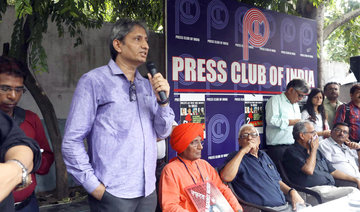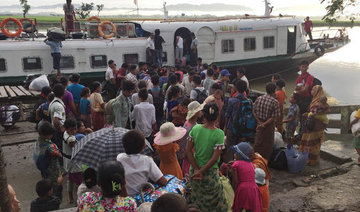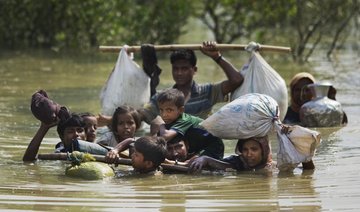ANKARA: As nearly 150,000 Rohingya Muslims have fled to neighboring Bangladesh and tens of thousands were internally displaced due to a risk of ethnic cleansing in Myanmar, Turkey extends a helping hand to the Muslim minority on humanitarian and diplomatic platforms.
Following President Recep Tayyip Erdogan’s telephon conversation with Myanmar State Counselor Aung San Su Kyi on Monday, Myanmar allowed Turkish Cooperation and Coordination Agency (TIKA), a Turkish aid agency, to distribute 1,000 tons of aid to Rohingya Muslims in Rakhine State, Turkey’s presidential spokesman Ibrahim Kalin announced. Kalin also said that Turkey plans to deliver aid initially to 100,000 families in coordination with the governments of Myanmar and Bangladesh.
TIKA will be the first foreign agency to distribute aid to the Rohingya despite the Myanmar government’s doubts about the international aid organizations that were accused by Kyi of helping terrorism in the country.
On the diplomatic front, Turkish Foreign Minister Mevlut Cavusoglu and Turkey’s First Lady Emine Erdogan are expected to visit Cox’s Bazar district in Bangladesh’s border with Myanmar on Sept. 6-8 to observe the on-site situation of thousands of Rohingya who have taken shelter there. In a speech in Istanbul at the weekend, Erdogan accused Myanmar of committing genocide against Muslims.
Dr. Altay Atli, a research associate specializing on the Asia-Pacific region at Sabanci University's Istanbul Policy Center, said humanitarian aid has become a crucial instrument of Turkish foreign policy and a major source of Turkey’s normative power abroad.
“In 2016, Turkey was the second largest source of humanitarian aid in the world, with a total of $6 billion distributed to various regions in need,” Atli told Arab News. According to Atli, Turkey’s leading role in the Rohingya issue has two components: Humanitarian aid, including an open check offered to Bangladesh to cover the costs of the refugees, and diplomatic initiatives, such as taking the issue to the UN and mobilizing the Organisation of Islamic Cooperation (OIC). “These two components, implemented together, can be effective,” he said.
Turkey also brought the Myanmar issue to the agenda of Asian Parliamentary Assembly’s Standing Committee meeting on Social and Cultural Affairs that was held through Aug. 31–Sept. 2, and was attended by various delegations including UAE. On the insistence of the Turkish delegation, Myanmar is included in the list of countries on the verge of humanitarian catastrophe, besides Syria, Iraq, and Yemen.
But, Atli underlined, Turkey cannot solve the problem on its own, as the Myanmar government needs to change the way it treats the Rohingya, and this requires coordinated action from the international community.
“The international community needs to show the Myanmar government that they need to solve this problem, otherwise there will be consequences including economic ones,” he said. Moreover, Atli believes Turkey’s aid to the region is perceived well by regional actors.
“Turkey is not seen as a rival or competitor in this region, but rather as a contributor, especially since Turkey’s expansive aid to the region after the tsunami disaster of 2004,” he said.
It is not the first time that Turkey is involved in humanitarian relief for Rohingya Muslims. Since 2012, when communal violence broke out between Buddhist and Muslim populations, Turkish aid agencies, NGOs and the government were very active in terms of humanitarian assistance, with high-level politicians visiting refugee camps and mediating with the government in Myanmar for the resolution of the crisis.
“Since the eruption of violence in Myanmar, Turkey used various platforms to draw attention to the plight of Rohingya Muslims. However, it is very hard to say at this point whether Turkey was single handedly able to mobilize the international community,” Senem Cevik, expert on political communication from University of California Irvine, told Arab News.
According to Cevik, the effects of Turkey’s efforts in mobilizing the international community will depend on Rohingya’s place in global agenda and news coverage.
“In the Myanmar case, the regime has blocked all UN aid to civilians with an exception of Turkey,” she said.
“At a critical time when there are multiple refugee crises across the globe and inept global response, Turkey’s eagerness to provide aid to Rohingya Muslims will be well received by the international community and it can be seen as Turkey’s compassion toward Muslim communities.”
Turkish aid agency offers a lifeline to Rohingya Muslims
Turkish aid agency offers a lifeline to Rohingya Muslims

Lebanon PM to visit new Damascus ruler on Saturday

- Lebanon’s Prime Minister Najib Mikati will on Saturday make his first official trip to neighboring Syria since the fall of president Bashar Assad, his office told AFP
BERUIT: Lebanon’s Prime Minister Najib Mikati will on Saturday make his first official trip to neighboring Syria since the fall of president Bashar Assad, his office told AFP.
Mikati’s office said Friday the trip came at the invitation of the country’s new de facto leader Ahmed Al-Sharaa during a phone call last week.
Syria imposed new restrictions on the entry of Lebanese citizens last week, two security sources have told AFP, following what the Lebanese army said was a border skirmish with unnamed armed Syrians.
Lebanese nationals had previously been allowed into Syria without a visa, using just their passport or ID card.
Lebanon’s eastern border is porous and known for smuggling.
Lebanese Shiite group Hezbollah supported Assad with fighters during Syria’s civil war.
But the Iran-backed movement has been weakened after a war with Israel killed its long-time leader and Islamist-led rebels seized Damascus last month.
Lebanese lawmakers elected the country’s army chief Joseph Aoun as president on Thursday, ending a vacancy of more than two years that critics blamed on Hezbollah.
For three decades under the Assad clan, Syria was the dominant power in Lebanon after intervening in its 1975-1990 civil war.
Syria eventually withdrew its troops in 2005 under international pressure after the assassination of Lebanese ex-prime minister Rafic Hariri.
UN says 3 million Sudan children facing acute malnutrition

- Famine has already gripped five areas across Sudan, according to a report last month
- Sudan has endured 20 months of war between the army and the paramilitary forces
PORT SUDAN, Sudan: An estimated 3.2 million children under the age of five are expected to face acute malnutrition this year in war-torn Sudan, according to the United Nations Children’s Fund (UNICEF).
“Of this number, around 772,000 children are expected to suffer from severe acute malnutrition,” Eva Hinds, UNICEF Sudan’s Head of Advocacy and Communication, told AFP late on Thursday.
Famine has already gripped five areas across Sudan, according to a report last month by the Integrated Food Security Phase Classification (IPC), a UN-backed assessment.
Sudan has endured 20 months of war between the army and the paramilitary Rapid Support Forces (RSF), killing tens of thousands and, according to the United Nations, uprooting 12 million in the world’s largest displacement crisis.
Confirming to AFP that 3.2 million children are currently expected to face acute malnutrition, Hinds said “the number of severely malnourished children increased from an estimated 730,000 in 2024 to over 770,000 in 2025.”
The IPC expects famine to expand to five more parts of Sudan’s western Darfur region by May — a vast area that has seen some of the conflict’s worst violence. A further 17 areas in western and central Sudan are also at risk of famine, it said.
“Without immediate, unhindered humanitarian access facilitating a significant scale-up of a multisectoral response, malnutrition is likely to increase in these areas,” Hinds warned.
Sudan’s army-aligned government strongly rejected the IPC findings, while aid agencies complain that access is blocked by bureaucratic hurdles and ongoing violence.
In October, experts appointed by the United Nations Human Rights Council accused both sides of using “starvation tactics.”
On Tuesday the United States determined that the RSF had “committed genocide” and imposed sanctions on the paramilitary group’s leader.
Across the country, more than 24.6 million people — around half the population — face “high levels of acute food insecurity,” according to IPC, which said: “Only a ceasefire can reduce the risk of famine spreading further.”
Turkiye says France must take back its militants from Syria

- Ankara is threatening military action against Kurdish fighters in the northeast
- Turkiye considers the Kurdish-led Syrian Democratic Forces as linked to its domestic nemesis
ISTANBUL: France must take back its militant nationals from Syria, Turkiye’s top diplomat said Friday, insisting Washington was its only interlocutor for developments in the northeast where Ankara is threatening military action against Kurdish fighters.
Foreign Minister Hakan Fidan insisted Turkiye’s only aim was to ensure “stability” in Syria after the toppling of strongman Bashar Assad.
In its sights are the Kurdish-led Syrian Democratic Forces (SDF) which have been working with the United States for the past decade to fight Daesh group militants.
Turkiye considers the group as linked to its domestic nemesis, the Kurdistan Workers Party (PKK).
The PKK has waged a decades-long insurgency in Turkiye and is considered a terror organization by both Turkiye and the US.
The US is currently leading talks to head off a Turkish offensive in the area.
“The US is our only counterpart... Frankly we don’t take into account countries that try to advance their own interests in Syria by hiding behind US power,” he said.
His remarks were widely understood to be a reference to France, which is part of an international coalition to prevent a militant resurgence in the area.
Asked about the possibility of a French-US troop deployment in northeast Syria, he said France’s main concern should be to take back its nationals who have been jailed there in connection with militant activity.
“If France had anything to do, it should take its own citizens, bring them to its own prisons and judge them,” he said.
Lebanese caretaker PM says country to begin disarming south Litani to ensure state presence

- Najib Mikati: ‘We are in a new phase – in this new phase, we will start with south Lebanon and south Litani’
DUBAI: Lebanese caretaker Prime Minister Najib Mikati said on Friday that the state will begin disarming southern Lebanon, particularly the south Litani region, to establish its presence across the country.
“We are in a new phase – in this new phase, we will start with south Lebanon and south Litani specifically in order to pull weapons so that the state can be present across Lebanese territory,” Mikati said.
Tanker hit by Yemen militia that threatened Red Sea spill has been salvaged

- The Sounion had been a disaster in waiting in the waterway, with 1 million barrels of crude oil aboard
- The Houthis have targeted some 100 merchant vessels with missiles and drones since the war in Gaza started
DUBAI: An oil tanker that burned for weeks in the Red Sea and threatened a massive oil spill has been “successfully” salvaged, a security firm said Friday.
The Sounion had been a disaster in waiting in the waterway, with 1 million barrels of crude oil aboard that had been struck and later sabotaged with explosives by Yemen’s Iranian-backed Houthi militia. It took months for salvagers to tow the vessel away, extinguish the fires and offload the remaining crude oil.
The Houthis initially attacked the Greek-flagged Sounion tanker on Aug. 21 with small arms fire, projectiles and a drone boat. A French destroyer operating as part of Operation Aspides rescued its crew of 25 Filipinos and Russians, as well as four private security personnel, after they abandoned the vessel and took them to nearby Djibouti.
The Houthis later released footage showing they planted explosives on board the Sounion and ignited them in a propaganda video, something the militia have done before in their campaign.
The Houthis have targeted some 100 merchant vessels with missiles and drones since the war in Gaza started in October 2023. They seized one vessel and sank two in the campaign that has also killed four sailors. Other missiles and drones have either been intercepted by a US-led coalition in the Red Sea or failed to reach their targets, which have included Western military vessels as well.
The Houthis maintain that they target ships linked to Israel, the US or the UK to force an end to Israel’s campaign against Hamas in Gaza. However, many of the ships attacked have little or no connection to the conflict, including some bound for Iran.






















